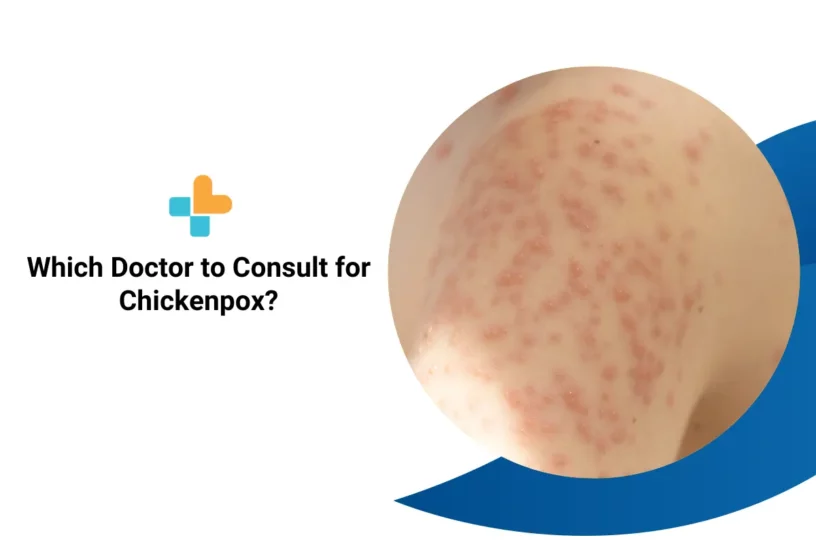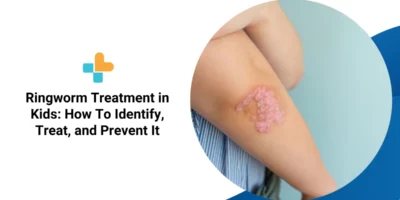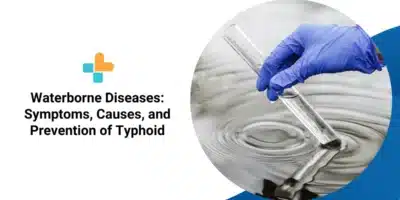Chickenpox is a highly contagious viral infection primarily affecting children. While most cases of chickenpox resolve on their own within a week or two, seeking medical guidance must be prioritized to ensure proper management and prevent complications.
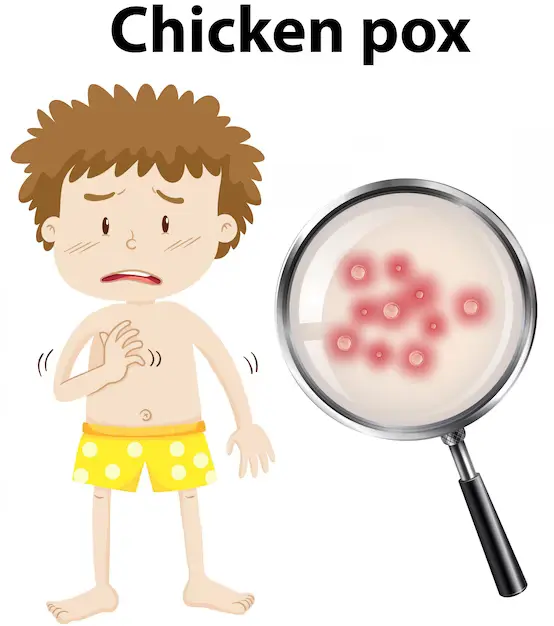
But with various healthcare professionals available, it can get a bit overwhelming to determine which doctor to consult for chickenpox.
In this blog, we will explore the different healthcare providers who can provide expert guidance and treatment for chickenpox, helping you make an informed decision for your child’s well-being.
Doctors to Consult for Chickenpox
Here are some doctors that can diagnose and treat chickenpox effectively.
1. Paediatricians
These doctors are specially trained in managing children’s illnesses and can provide appropriate care for children with chickenpox.
This includes monitoring symptoms, offering symptomatic relief, and suggesting necessary treatments.
2. Family Physicians
They can provide guidance on managing symptoms and preventing complications. Like paediatricians, family physicians monitor symptoms and suggest necessary treatments based on your family’s medical history.
3. Infectious Disease Specialists
These specialists are adept at managing severe or complicated cases of chickenpox and provide specialised care if necessary.
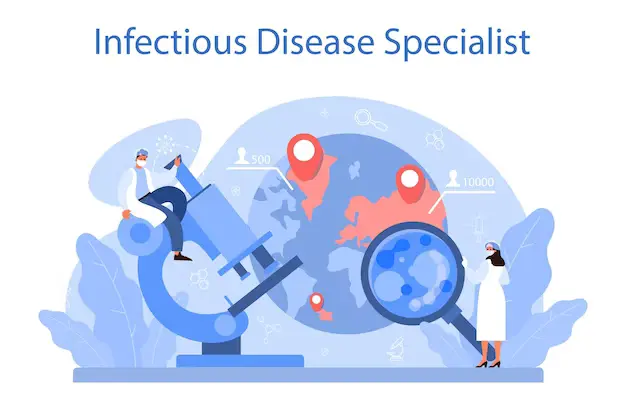
It is imperative to consult a certified healthcare professional for a proper diagnosis and guidance on the best treatment for chickenpox. They can assess the severity of the infection and recommend appropriate measures to ensure a safe and speedy recovery.
Signs You Have Chickenpox
If you happen to notice any of these symptoms, it may be a possibility of chickenpox.
- Rash: The primary sign of chickenpox is a red, itchy rash that starts as small, raised bumps and progresses to fluid-filled blisters.
- Fever: Chickenpox is often accompanied by a mild to moderate fever.
- Fatigue: Feeling tired and lethargic is a common symptom during the early stages of chickenpox.
- Headache: Some individuals may experience headaches, rash, and other symptoms.
Causes of Chickenpox
Common causes of chickenpox transmission include the following:
- Close contact: Being near an infected person who coughs, sneezes, or talks can spread the virus.
- Airborne transmission: VZV can also be transmitted through airborne particles, especially when an infected person breathes out or through tiny droplets.
- Touching contaminated surfaces: Direct contact with objects or surfaces contaminated with the contagious virus, such as toys or clothing, can contribute to the spread of chickenpox.
- Lack of Immunity: Individuals who have not been previously infected or vaccinated against chickenpox are more susceptible to contracting the virus.
To prevent chickenpox, practising good hygiene, such as frequent handwashing, covering the mouth and nose while coughing or sneezing, and preventing close contact with infected individuals is important.
Specialized Doctors to Consult at Ayu Health
For chickenpox and similar contagious diseases, we have an entire team of doctors who are always on standby. Here are some of our pioneering medical specialists:
- Dr Susheela Suresh (Internal Medicine, General Physician)
MD – General Medicine, MBBS Internal Medicine, General Physician 37+ years
- Dr Manju Goswami (Pediatrics)
MBBS, DCH, MS 46+ years
- Dr Latika Bhalla Cl ((Paediatrician)
MBBS, DNB
Dermatology 37+ years
Takeaway
Chickenpox is a common viral infection that affects children but can also occur in adults.
It is important to seek medical advice and consult a healthcare professional, such as a dermatologist, for proper diagnosis and guidance on managing the symptoms.
While most cases of chickenpox resolve on their own, medical treatment can help alleviate discomfort and prevent complications.
Beat chickenpox with the leading team of medical experts at Ayu Health, where you’ll be assessed thoroughly and prescribed appropriate treatment. Visit our website or call us at +91 6366-100-800 to schedule your appointment.
FAQs
1. Can Dermatologists Treat Chickenpox?
Yes, dermatologists can treat chickenpox by providing appropriate medication, recommending soothing lotions, and advising on how to manage symptoms and prevent complications.
2. What Will a Doctor Do for Chickenpox?
A doctor will assess the severity of symptoms, provide symptomatic relief, and may prescribe antiviral medication in severe cases to shorten the duration of the illness.
3. What Food Should be Avoided for Chickenpox?
During chickenpox, it is advisable to avoid spicy, salty, and acidic foods that can irritate mouth sores. Soft, bland foods and plenty of fluids are recommended for easy swallowing.
4. Can Chickenpox Go Without Treatment?
Yes, in many cases, chickenpox can resolve on its own without specific treatment. However, managing symptoms, preventing scratching, and monitoring for any complications that may require medical intervention is important.
Also read: Preventing Infectious Diseases in India: Latest Strategies and Innovations
Our Hospital Locations
General Surgery Hospitals in Chandigarh | General Surgery Hospitals in Bangalore | General Surgery Hospitals in Jaipur | General Surgery Hospitals in NCR | General Surgery Hospitals in Hyderabad
Our Doctors
General Surgery Doctors in Chandigarh | General Surgery Doctors in Bangalore | General Surgery Doctors in Jaipur | General Surgery Doctors in NCR | General Surgery Doctors in Hyderabad
References:
https://www.ncbi.nlm.nih.gov/books/NBK448191/
https://www.ncbi.nlm.nih.gov/books/NBK448191/
https://pubmed.ncbi.nlm.nih.gov/7351951/
https://www.ncbi.nlm.nih.gov/books/NBK279622/
https://www.ncbi.nlm.nih.gov/pmc/articles/PMC523567/
About the Author

Dr. S. Goel
Dr. S. Goel is a renowned Internal Medicine Specialist currently practicing at Ayu Health, Bangalore. He is a Specialist in Internal Medicine, Diabetes HTN, Paediatric Care, and Family Medicine.

